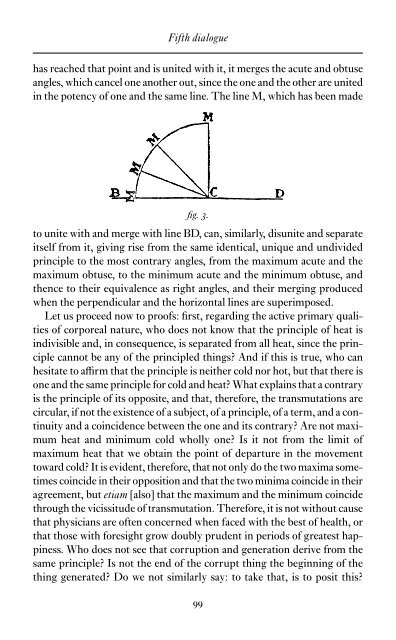Create successful ePaper yourself
Turn your PDF publications into a flip-book with our unique Google optimized e-Paper software.
Fifth dialogue<br />
has reached that point and is united with it, it merges the acute and obtuse<br />
angles, which cancel one another out, since the one and the other are united<br />
in the potency of one and the same line. The line M, which has been made<br />
fig. 3.<br />
to unite with and merge with line BD, can, similarly, disunite and separate<br />
itself from it, giving rise from the same identical, unique and undivided<br />
principle to the most contrary angles, from the maximum acute and the<br />
maximum obtuse, to the minimum acute and the minimum obtuse, and<br />
thence to their equivalence as right angles, and their merging produced<br />
when the perpendicular and the horizontal lines are superimposed.<br />
Let us proceed now to proofs: first, regarding the active primary qualities<br />
of corporeal nature, who does not know that the principle of heat is<br />
indivisible and, in consequence, is separated from all heat, since the principle<br />
cannot be any of the principled things? And if this is true, who can<br />
hesitate to affirm that the principle is neither cold nor hot, but that there is<br />
one and the same principle for cold and heat? What explains that a contrary<br />
is the principle of its opposite, and that, therefore, the transmutations are<br />
circular, if not the existence of a subject, of a principle, of a term, and a continuity<br />
and a coincidence between the one and its contrary? Are not maximum<br />
heat and minimum cold wholly one? Is it not from the limit of<br />
maximum heat that we obtain the point of departure in the movement<br />
toward cold? It is evident, therefore, that not only do the two maxima sometimes<br />
coincide in their opposition and that the two minima coincide in their<br />
agreement, but etiam [also] that the maximum and the minimum coincide<br />
through the vicissitude of transmutation. Therefore, it is not without cause<br />
that physicians are often concerned when faced with the best of health, or<br />
that those with foresight grow doubly prudent in periods of greatest happiness.<br />
Who does not see that corruption and generation derive from the<br />
same principle? Is not the end of the corrupt thing the beginning of the<br />
thing generated? Do we not similarly say: to take that, is to posit this?<br />
99

















